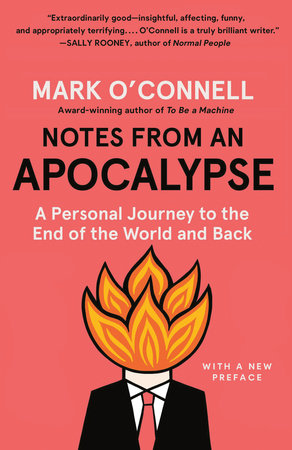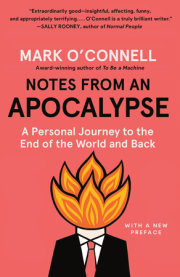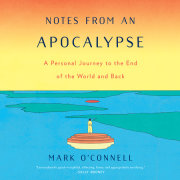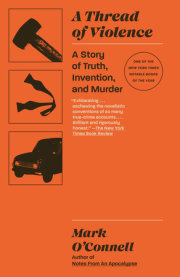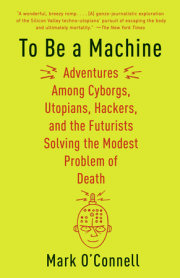1
Tribulations
It was the end of the world, and I was sitting on the couch watching cartoons with my son. It was late afternoon, and he was sprawled across my lap, looking at a show about a small Russian peasant girl and the comic scrapes she gets embroiled in with her long-suffering bear companion. I was holding my phone over his head, scrolling downward through my Twitter feed. The bear and the girl were involved in some kind of fishing-based slapstick escapade, in which the bear was doing a lot of stumbling about and falling over. My son was giggling happily at this, turning his face periodically upward to ensure that I was aware of the amusing pratfalls unfolding on our television screen.
On the smaller screen of my phone, I came across an embedded YouTube video on which, precisely because its accompanying text advertised it as “soul-crushing” and “heart-wrenching,” I clicked without hesitation.
As my son watched his cartoon, I held my phone above his line of vision and watched an emaciated polar bear dragging itself across a rocky terrain, falling to its knees and struggling to lift itself again, hauling its tufted carcass onward toward a cluster of rusting metal barrels half filled with trash, from which it eventually managed to paw out what looked like a knuckle of raw bone, more or less totally devoid of meat. The animal was a pathetic sight; because of the wasting effects of malnutrition, it looked more like a gargantuan stoat or weasel than a polar bear. As it slowly chewed whatever it was that it had managed to scavenge from the trash, its eyes half closed in deep and terminal fatigue, a white tide of saliva frothed slowly from its mouth, while over this footage a cello played a slow and mournful glissando.
I turned down the sound on my phone so as not to attract my son’s attention, his inexorable questions. He was three then, and our relationship in those days took the form of an endless interrogation.
A text at the bottom of the screen explained that the footage was shot near an abandoned Inuit village in the northern Canadian tundra, where the bear had strayed in search of food, the population of seals, its usual food source, having been drastically diminished by the effects of climate change.
My soul remained uncrushed, my heart more or less unwrenched. I felt instead a creeping disgust at the footage itself, at the manner of its presentation—the lachrymose music, the stately pace of the editing—which seemed designed to elicit in me a recognition of my own contribution to this terrible situation, together with a virtuous and perhaps even redemptive swelling of sorrow, of noble sadness at the ecological destruction in which I myself was playing a role. It occurred to me then that the disgust I felt was the symptom of a kind of moral vertigo, resulting from the fact that the very technology that allowed me to witness the final pathetic tribulations of this emaciated beast was in fact a cause of the animal’s suffering in the first place. The various rare-earth minerals that were mined for the phone’s components in places whose names I would never be required to learn; the fuels consumed in the course of its construction, its shipping halfway across the world, its charging with electrical current on a daily basis: it was for the sake of all this, and in my name, that the bear was starving and dragging itself across the rocky ground.
The slapstick capering of the cartoon bear my son was watching on the television screen and, above his head, the awful distress of the real bear on the smaller screen: the absurd juxtaposition of these images, simultaneously summoned from the ether and vying for attention, generated a strange emotional charge, a surge of shame and sadness at the world my son would be forced to live in, a shame and sadness that I in turn was passing on to him.
It seemed to me that I was being confronted with an impossible problem: the problem of reconciling the images on these two screens, or at least of living with the fact of their irreconcilability. The bears in his world were always hanging out with kids and having adventures, living in cabins, enduring comic mishaps, coming good in the end. The bears in mine were all rummaging in bins and starving to death. I wanted him to live in that first world, that good world, as long as possible, but I knew that soon enough he would have to leave it and live in the future. And it was not obvious to me how a person was supposed to raise children, to live and work with a sense of meaning and purpose, in the quickening shadow of that future.
It didn’t take much, in those days, to set me off on a path toward the end of the world. There were frequent opportunities to indulge my tendency toward the eschatological. Cartoons, viral videos, radio news bulletins, uneasy exchanges with neighbors about how it never used to be this warm in February. So many things felt like a flashback sequence in the first act of a postapocalyptic movie, like we were living right before the events of the main timeline kicked in. I knew that this kind of thinking was as old as human civilization itself, that imagining the apocalypse was immemorially a response to times of rapid change and uncertainty. This recognition made it no less oppressive, no less real.
What did I feel when I thought about my son and his future? I felt a kind of abstract but all-consuming melancholy. My love for him felt like an insoluble moral problem. The smart money seemed to be on apocalypse, but as a parent I felt I had some kind of moral duty to be deluded about the future, to avert my gaze from the horizon. I was by no means living up to this duty.
We are alive in a time of worst-case scenarios. The world we have inherited seems exhausted, destined for an absolute and final unraveling. Look: there are fascists in the streets, and in the palaces. Look: the weather has gone uncanny, volatile, malevolent. The wealth and power of nominal democracies is increasingly concentrated in the hands of smaller and more heedless minorities, while life becomes more precarious for ever larger numbers of people. The old alliances, the postwar dispensations, are lately subject to a dire subsidence. The elaborate stage settings of global politics, the drawing rooms and chandeliers, are being dismantled, disappearing off into the wings, laying bare the crude machinery of capital. The last remaining truth is the supreme fiction of money, and we are up to our necks in a rising sludge of decomposing facts. For those who wish to read them, and for those who do not, the cryptic but insistent signs of apocalypse are all around.
Another browser window, another omen of the end. A UN report detailing how one million species are at risk of imminent extinction. An image of a waterfall cascading into the Arctic from the sheer cliff face of a melting glacier. The proliferation of antibiotic-resistant diseases. And all of it subject to the great flattening effect of the online discourse.
Listen. Attune your ear to the general discord, and you will hear the cracking of the ice caps, the rising of the waters, the sinister whisper of the near future. Is it not a terrible time to be having children, and therefore, in the end, to be alive? This question is not a rhetorical one. I myself go back and forth on it, obsessively, helplessly, talking myself in and out of different kinds of answers. And if it is now a terrible time to be alive and having children, you have to ask when, in the scheme of things, it was ever a good one.
Having children is the most natural thing in the world, and at the same time among the most morally fraught. During the time I am talking about here, I was consumed—pointlessly, morbidly consumed—by the question of whether having brought a human being into the world was a terrible ethical blunder, given what seemed to lie ahead. The last thing the world needed, after all, was more people in it, and the last thing any hitherto nonexistent person needed was to be in the world. It was of course a little late in the day now, the deed being well and truly done, to be giving serious attention to these fundamental questions, but then again it was precisely the day’s lateness that brought the questions themselves into absolute focus.
Because the first thing to be said about becoming a parent, whether it happens by choice or by chance, is that it is one of only very few events in life that are entirely irreversible. Once you’re in, existentially speaking, you’re in. And so the real question, the only question—given what the world is, how dark and uncertain its future—is that of how to proceed. How are we supposed to live, given the distinct possibility that our species, our civilization, might already be doomed?
Should we just ignore the end of the world?
Again, the question is not wholly ironic: on a personal level, I’m open to the suggestion that such a response—by which I mean no response at all—might well be the sanest one, given the situation. It’s certainly the easiest response, and therefore by some distance the most tempting. The problem, our problem as a culture—which, I may as well admit, neatly dovetails with my problem as a writer, and to some hopefully limited extent yours as a reader—is one of boredom.
Copyright © 2020 by Mark O'Connell. All rights reserved. No part of this excerpt may be reproduced or reprinted without permission in writing from the publisher.

